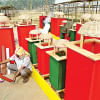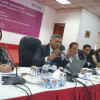Pandemic's new poor unable to recover: study

People who fell into poverty due to the Covid-19 pandemic remain unable to recover to their previous economic status amid the financial crises induced by the Russia-Ukraine war and high inflation, according to a recent study.
Besides, these "new poor" are vulnerable to further deterioration of their financial health as they lack strong networks with employers, access to loans and social safety net programmes.
These findings were revealed in a paper titled "Being New Poor in Bangladesh: Coping Strategies, Constraints, and Trajectories".
The paper was presented during a session of the "First Development Studies International Conference-DSIC 2024", at the Pan Pacific Sonargaon Dhaka yesterday.
The study was conducted by a group of researchers comprising officials of the Institute of Development Studies and the BRAC Institute of Governance and Development (BIGD).
The study was carried out over 11 months on 39 "new poor" households in Khulna.
"The new poor have been facing a variety of constraints covering asset depletion and debt traps, health-related adversities, and distrust in and low expectations from the state," said Jahid Nur, a BIGD research associate.
"We primarily employed financial, livelihood, cost reduction and social safety strategies and found that intermediaries were key to accessing social safety nets," he added while presenting the paper.
Nur also said the paper describes and presents an analysis of the strategies used by respondents for coping with the pandemic-induced shocks, their attempts to come out of poverty and associated constraints.
According to the findings, the new poor could not recover in the aftermath of the pandemic and Russia-Ukraine war. The study also found that inflation has become a big burden on their recovery efforts.
"But we haven't seen any systematic state support for them to recover from the financial difficulties," he added.
Another important finding was that political affiliations had helped several households secure the required documentation for social protection schemes, he said.
"When they [the new poor] approached the state to get support, they were told they are not so poor," he said.
"They were also told that there are many other people who are poorer than them (new poor) and so the state support is mostly for the ultra-poor," Nur added.

 For all latest news, follow The Daily Star's Google News channel.
For all latest news, follow The Daily Star's Google News channel. 








Comments